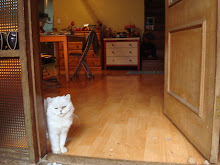 |
| Navajo patterned socks by Coevel, left, and Uniqlo on right. |
Coevel said on its blog Tuesday that the Japanese brand illegally copied its “Navajo” patterned socks. The fashion accessories company was established in 2010 by two male designers.
“I found out about it a few days ago when I went shopping in a Uniqlo store. I was just dumbfounded that day,” Coevel CEO Kim Ji-young said Tuesday in a telephone interview.
“As you already know, there are so many SPA brands out there that just constantly copy designs from small- and medium-sized firms. It’s not fair. If necessary, I am ready to take legal action against Uniqlo,” Kim said, adding that he will make a decision once Uniqlo announces its official stance.
Coevel said it first designed the socks back in the summer of 2010 and manufacturing started in April 2011, whereas Uniqlo’s first production date was December last year. The Uniqlo socks are available in stores in eight colors.
“The Navajo print, a traditional pattern of the Indian tribe, has been used in such items as scarves, skirts and socks in different sizes or details, but Uniqlo used exactly same the pattern, detail and size as ours and put it in the same position with the same ratio. It’s basically the same stuff. It can’t be a coincidence,” Kim said.
Uniqlo head office in Japan posted a public apology on their Korean website Thursday, admitting that they did copy the designer’s pattern.
“We should have been more careful about the use of the pattern. We are stopping the sale of our product,” the company said.
This is not the first time Coevel has been in this situation. It posted claims on its blog in February last year that 8 Seconds, a SPA brand owned by Cheil Industries copied the design of their socks without permission and hence violated copyright. 8 Seconds made an official apology on their blog and Facebook, admitting that they did illegally copy Coevel’s design.
Kim said the matter has been settled but declined to elaborate further, citing the sensitivity of the issue.
According to industry insiders, similar issues occur quite often in the fast-paced fashion industry.
“For us, we analyze and set new trends and designs about a year and a half in advance and regularly present our collections at the same as all designer brands, but brands such as Uniqlo and Zara can almost immediately produce similar items,” said H&M PR manager Cheong Hae-jin said Wednesday. “There are thousands of items designed every month and year so some of them can possibly overlap because fashion trends repeat themselves. But I think it’s an ethical issue. Big companies should try to constrain themselves from copying creations by small ones.”
For small fashion firms, when it comes to design infringement scandals, it is hard for them to protect their rights due to the high cost of hiring patent lawyers and registering their designs with the Korean Intellectual Property Office.
“There are two ways for them to appeal ― the design protection act and copyright laws. But the problem with small companies is that they can’t afford to pay the design registration fee, which is around 600,000 won per pattern so they won’t be protected by the design protection act. Copyright laws work differently, and protect them even if their designs are not registered,” a local law firm said.
The Korea Copyright Commission told The Korea Times that both sides will need to show circumstantial evidence to the court to decide whether there was an infringement of copyright.
The Coevel CEO said he hopes to see more consumers and producers becoming aware of the “unfair” situation that small companies are facing so that no more patent disputes happen in the future.
Source: KT


















 sarahinsouthkorea
sarahinsouthkorea
